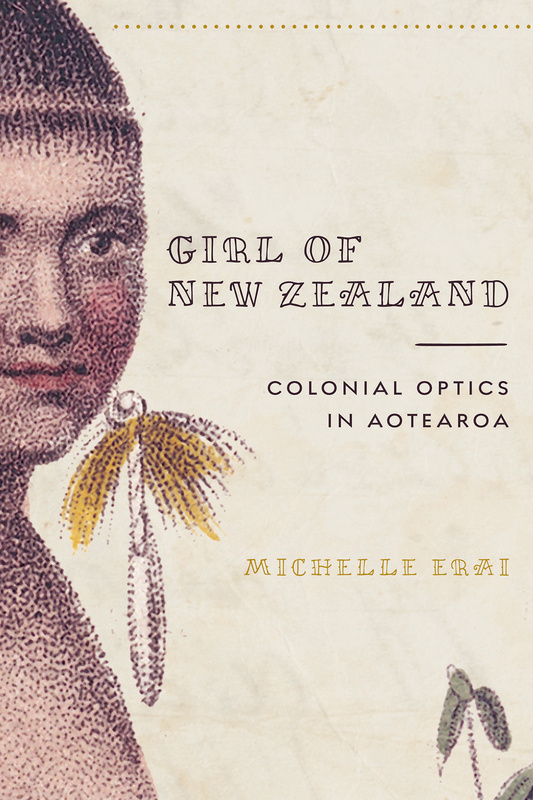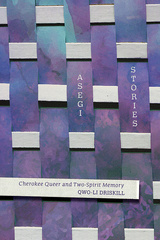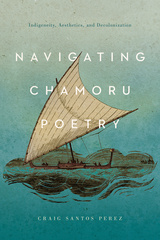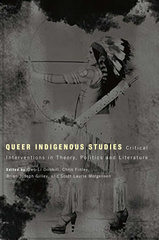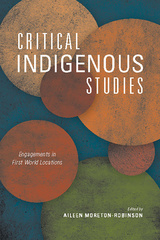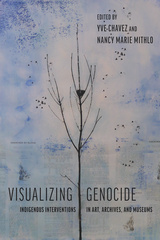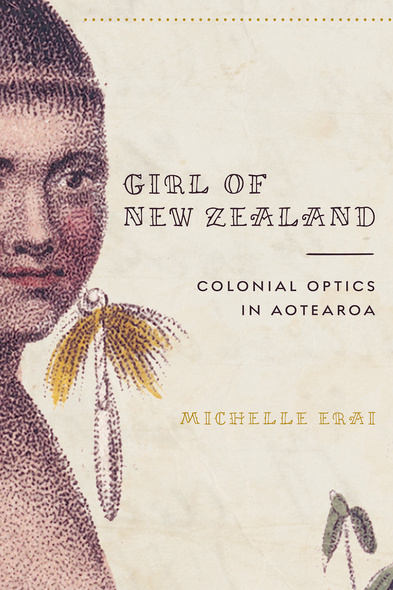
200 pages, 6 x 9
20 color illustrations, 16 b&w illustrations
Paperback
Release Date:19 May 2020
ISBN:9780816537020
Girl of New Zealand
Colonial Optics in Aotearoa
The University of Arizona Press
Girl of New Zealand presents a nuanced insight into the way violence and colonial attitudes shaped the representation of Māori women and girls. Michelle Erai examines more than thirty images of Māori women alongside the records of early missionaries and settlers in Aotearoa, as well as comments by archivists and librarians, to shed light on how race, gender, and sexuality have been ascribed to particular bodies.
Viewed through Māori, feminist, queer, and film theories, Erai shows how images such as Girl of New Zealand (1793) and later images, cartoons, and travel advertising created and deployed a colonial optic. Girl of New Zealand reveals how the phantasm of the Māori woman has shown up in historical images, how such images shape our imagination, and how impossible it has become to maintain the delusion of the “innocent eye.” Erai argues that the process of ascribing race, gender, sexuality, and class to imagined bodies can itself be a kind of violence.
In the wake of the Me Too movement and other feminist projects, Erai’s timely analysis speaks to the historical foundations of negative attitudes toward Indigenous Māori women in the eyes of colonial “others”—outsiders from elsewhere who reflected their own desires and fears in their representations of the Indigenous inhabitants of Aotearoa, New Zealand. Erai resurrects Māori women from objectification and locates them firmly within Māori whānau and communities.
Viewed through Māori, feminist, queer, and film theories, Erai shows how images such as Girl of New Zealand (1793) and later images, cartoons, and travel advertising created and deployed a colonial optic. Girl of New Zealand reveals how the phantasm of the Māori woman has shown up in historical images, how such images shape our imagination, and how impossible it has become to maintain the delusion of the “innocent eye.” Erai argues that the process of ascribing race, gender, sexuality, and class to imagined bodies can itself be a kind of violence.
In the wake of the Me Too movement and other feminist projects, Erai’s timely analysis speaks to the historical foundations of negative attitudes toward Indigenous Māori women in the eyes of colonial “others”—outsiders from elsewhere who reflected their own desires and fears in their representations of the Indigenous inhabitants of Aotearoa, New Zealand. Erai resurrects Māori women from objectification and locates them firmly within Māori whānau and communities.
Girl of New Zealand presents a nuanced insight into the ways in which violence and colonial looking shaped the representation of Māori women and girls. Erai focuses on eight different depictions to think through the effects that colonial violence had on their construction and reception. In this way the author resurrects these women from objectification to being firmly located within Māori whānau and communities.’—Ngarino Ellis, author of A Whakapapa of Tradition: A Century of Ngāti Porou Carving, 1830–1930
‘Catching the tide of a resurgence of women’s issues in the wake of #MeToo and other feminist projects, Michelle Erai’s Girl of New Zealand is timely. Erai’s analysis speaks to the historical foundations of negative attitudes toward Indigenous Māori women in the eyes of colonial ‘others,’ outsiders from elsewhere who reflected their own desires and fears in their representations of the Indigenous inhabitants of Aotearoa.’—Arini Loader, Victoria University of Wellington
Michelle Erai was an assistant professor of gender studies at University of California, Los Angeles. She is originally from Whangarei, Aotearoa, and is descended from the tribes of Ngāpuhi and Ngati Porou.
Prologue
Acknowledgments
Introduction: Colonial Optics
1. Punch
2. Girl of New Zealand
3. Plage de Korora-reka
4. Māori and Europeans on the Deck of a Ship
5. Kiss Me
6. Spoils to the Victor
Conclusion: The House of Taonga
Epilogue
Notes
Bibliography
Index

